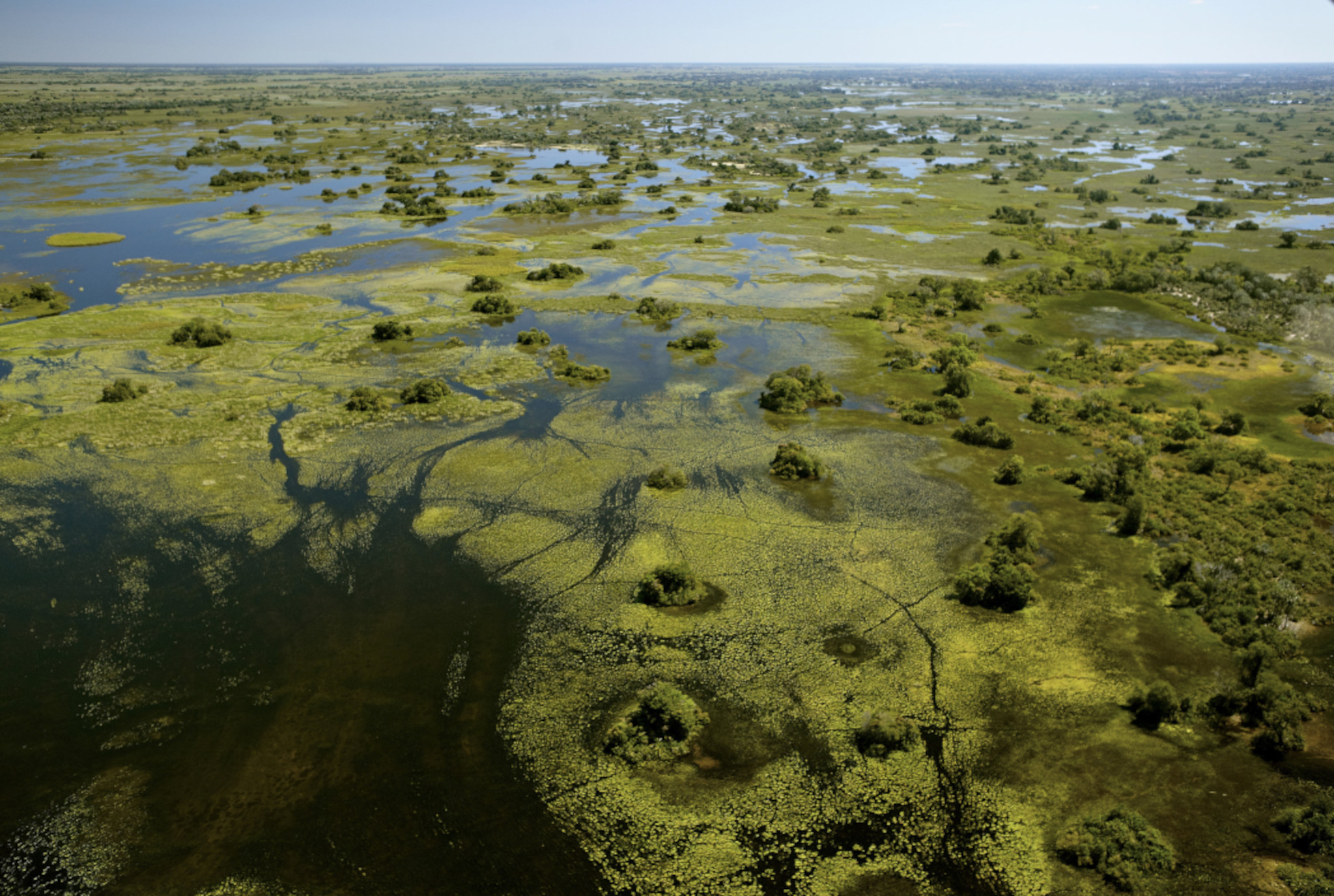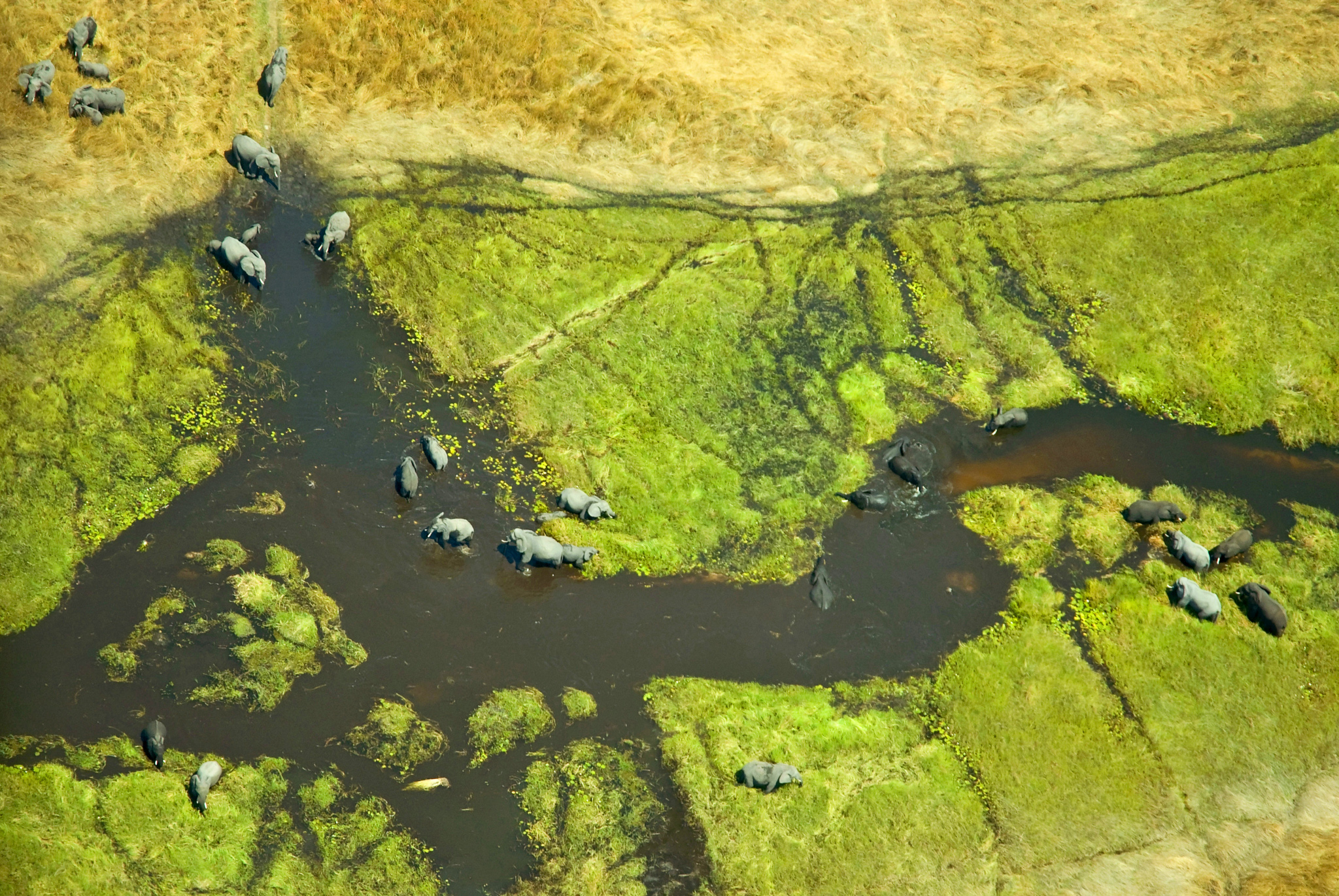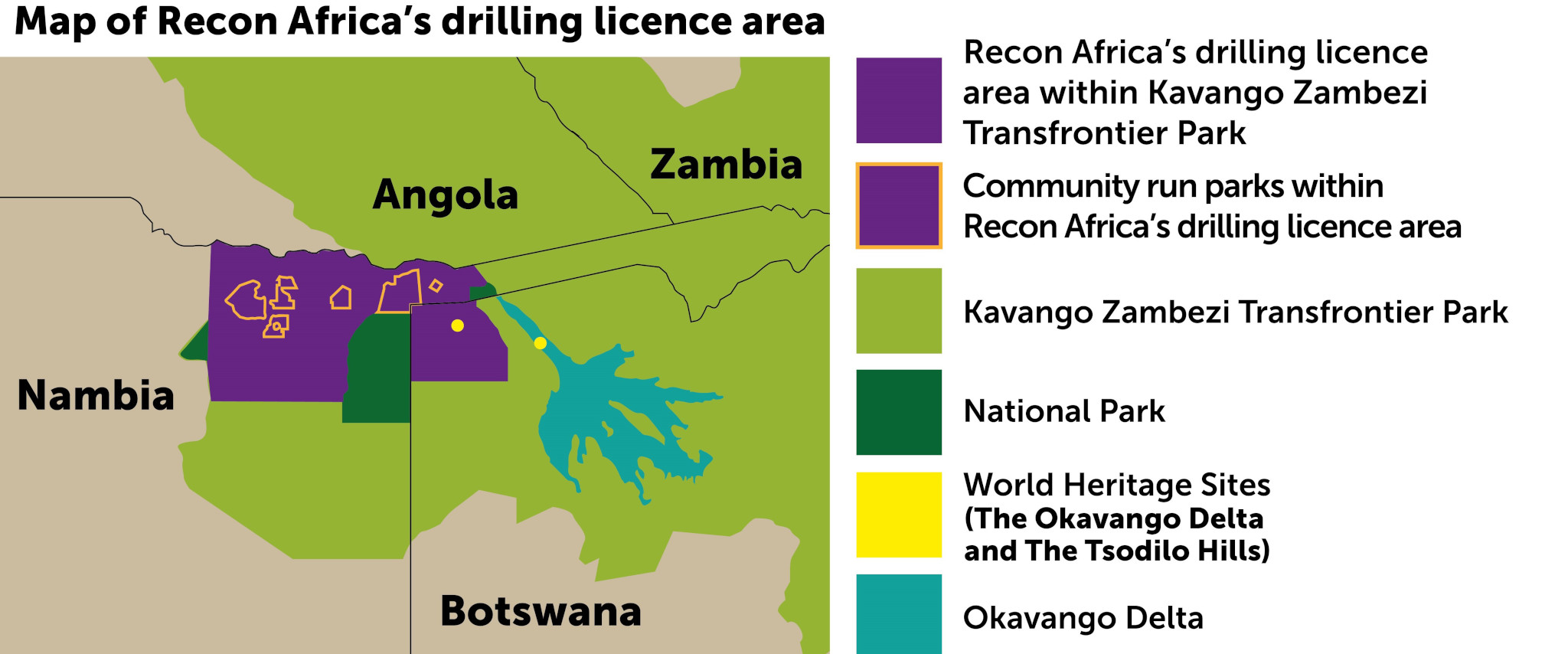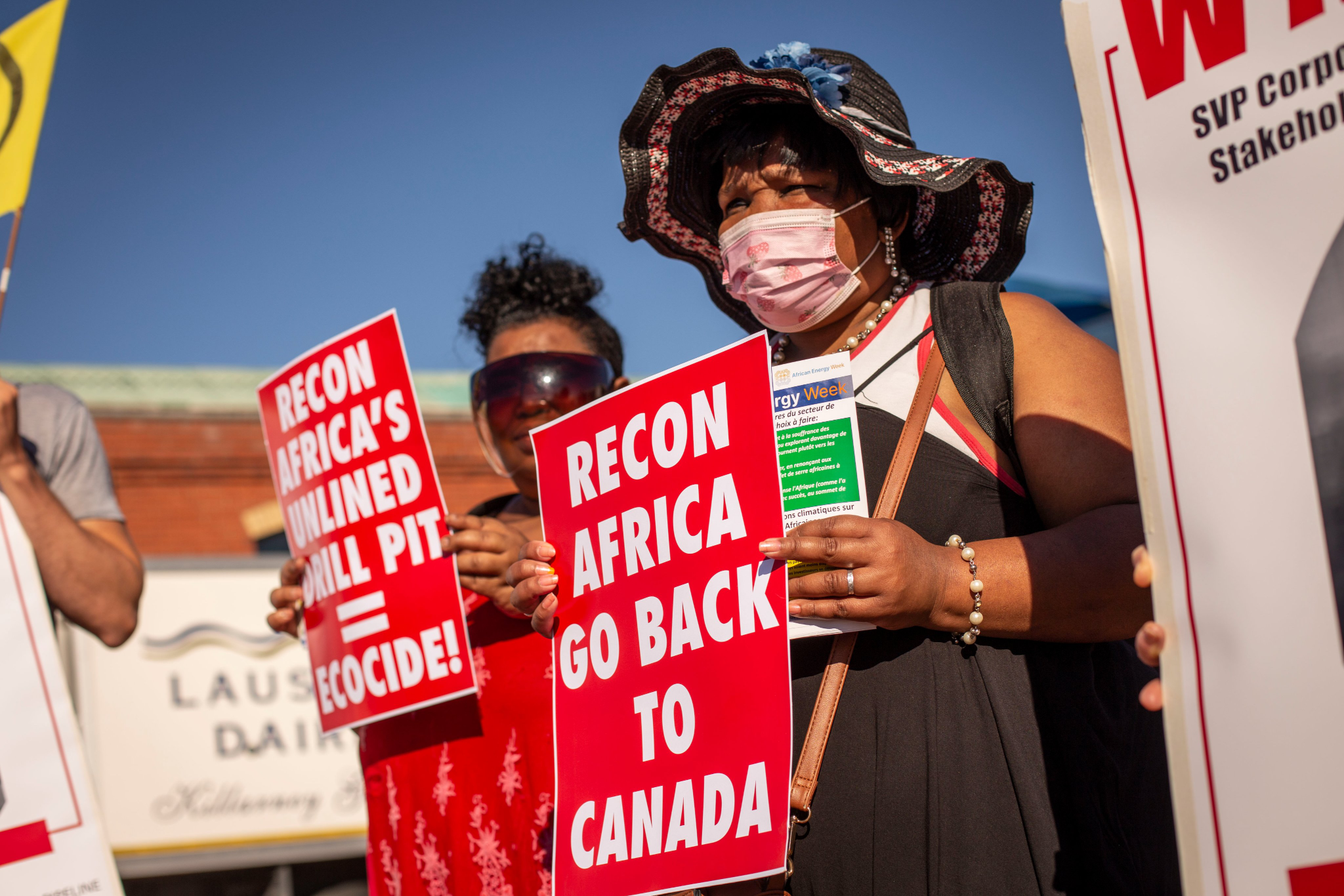Oil and Gas Drilling in the Okavango Region
Location of ReconAfrica's oil project in the Okavango basin. By zooming in, you can recognise the site of one of ReconAfrica's exploration wells.
Canadian company ReconAfrica is opening up a new oil and gas frontier in an area spanning from the northeast of Namibia to the northwest of Botswana. It holds exploration licenses covering 8.5 million acres between both countries, with Namibian state-owned oil company NAMCOR maintaining a 10% equity in the Namibian license.19233 Civil society organizations from both countries have called for an immediate halt of oil and gas exploration as ReconAfrica’s planned megaproject would cause immense harm to local communities and the region’s rich wildlife.
ReconAfrica is searching for oil in the Kavango Zambezi Transfrontier Nature Conservation Area (KAZA), a protected and ecologically fragile area. The KAZA crosses the borders of Angola, Botswana, Namibia, Zambia and Zimbabwe, and is nearly twice as large as the United Kingdom. The Okavango River flows right through the KAZA. Its water originates as seasonal rain in Angola’s highlands. In Botswana, the Okavango River fans out into the Kalahari Desert to form the Okavango Delta. The Okavango Delta transforms this otherwise dry area into a waterlogged wetland that provides vital water resources for animals, plants and over one million people.14611 The Okavango Delta is protected as a UNESCO World Heritage Site.15321
Notes on methodology: Reputational risk projects on GOGEL are updated annually. This article was last updated November 4 2025. In 2025, ReconAfrica did not meet the GOGEL thresholds and is thus not included in the company list above, which is based on GOGEL data. However, the company remains the driver behind the oil and gas expansion plans in the Okavango region.

ReconAfrica is exploring for oil in an area that is sacred to the Indigenous San. The San have lived in Southern Africa, including the lands around the Okavango River, for thousands of years. Historically, as hunter-gatherer societies, they lived off the land.14613 Although many San have lost access to their lands as a result of European colonization, the Okavango River Basin remains their sacred, traditional homeland.14615 Today, many dispossessed San communities rely on subsistence farming, hunting or jobs in the tourism sector to support themselves. In 2020, several San leaders embarked on a 300-mile “Walk to save the Okavango Delta” and petitioned the governments of Namibia and Botswana to halt drilling for oil and gas in the Okavango Region.14617 San communities say they do not want ReconAfrica’s project on their ancestral lands and worry that it could destroy the water, plants and animals their livelihoods depend on.14615
In total, more than 200,000 people live in the area that falls under ReconAfrica’s exploration licenses in the Kavango Basin.14619 Many locals only learned about the company’s plans once ReconAfrica began drilling.14621 The Canadian company started its work without the knowledge or approval of local communities.1461914623 In the rare cases where ReconAfrica provided information, it did so only in English, rather than in people’s native language.14625 One million people depend on the Okavango River.23293 It is a lifeline for the big five animal species: elephants, buffalos, rhinos, lions and leopards. The world's largest remaining population of endangered savanna elephants lives in the region, next to giraffes, zebras, antelopes, pangolins, 400 bird species and over 1,000 plant species.23294 The unique wildlife attracts tourists from near and far.
Ever since ReconAfrica launched its project in the Okavango Region, local people have reported the company's disregard of national and local regulations.14623 The chairperson of the Kapinga Kamwalye Conservancy, Thomas Muronga, said that ReconAfrica drilled illegally within the conservancy borders.14619 In the George Mukoya conservancy, the company has reportedly constructed a road through an intact forest without the necessary permits.14623 A farmer family has sued ReconAfrica for clearing their land without their permission.14627 The Namibian government found the company to have violated several laws throughout its operations, but stopped short of revoking its license.19435 In the United States, investors have taken ReconAfrica to court over their environmentally reckless drilling plans and the failure to consult local communities in Namibia and Botswana.14629 The company has gotten creative when it comes to stopping incoming criticism. In September 2021, ReconAfrica offered jobs to Thomas Muronga and Max Muyemburuko, two outspoken critics of the project. They both turned down the offer, which they saw as an attempt to silence them.19438
ReconAfrica’s credibility has been repeatedly questioned by investors and industry experts.15323 According to the investigative research group Viceroy Research, the company’s initial communications surrounding its Okavongo discovery appeared intentionally misleading. ReconAfrica allegedly paid for investment websites to publish numerous articles containing mislabeled, incomplete, and unconfirmed information concerning its operations.15325 19436 Viceroy claims ReconAfrica did this intentionally to target small-time investors using a Cambridge Analytica-style fake news network.15327 It is certainly dubious that a company with no previous experience in the sector came to hold the license for a generational discovery in a country where no productive reservoir has been discovered in 60 years.15329 ReconAfrica has since faced numerous shareholder lawsuits claiming to have been misled by the company. In 2024, ReconAfrica agreed to pay over USD 10 million to settle such claims by US and Canadian investors. 153311533315335 In 2023, Canadian authorities opened an investigation into the company for potential fraud and corruption.15337 Canadian legal experts have requested the Canadian Ombudsperson for Responsible Enterprise investigate ReconAfrica for apparent human rights violations in Namibia.19437
In the meantime, ReconAfrica continues to set up drilling rigs in the Okavango region.1533923295 It now claims to have identified a vast reserve of natural gas on the Namibian side of the Kavongo Basin.1944015341 The scramble has begun. Norwegian company BW Energy Ltd has acquired a 20% stake in the Namibian exploration licenses, while ReconAfrica rushes to build even more roads and drill more exploration wells in the region.1944123296 The company even intends to explore for more oil to the North of the Delta, in Angola.23297

Local communities and environmental groups are concerned what the region around the Okavango River will look like if ReconAfrica continues exploration and launches commercial oil production in the Kavango Basin. Drill rigs, connecting pipelines, pumping stations and access roads would fragment the region, disrupt hunting territories and obstruct migration routes.14633 Income from tourism will dwindle as tourists will not want to visit an industrialized oil landscape. In the worst case, an oil spill could pollute the Okavango River and ultimately the Okavango Delta.1944214619 Any pollution risks severe impacts to the watershed, which is even more frightening given the pronounced drought affecting the region.1944319444 Noise, infrastructure construction, toxic chemicals and oil spills from ReconAfrica’s project threaten one of the world’s most magnificent ecosystems, as well as the people who depend on it.15343

In 2020, ReconAfrica published its plan to extract the Kavango Basin’s oil and gas through fracking.1463514637 Fracking is especially controversial because it uses pressurized, water-based, toxic chemicals to release fossil fuels deep underground. Fracking consumes gigantic amounts of water, can cause earthquakes and frequently contaminates ground and surface water. It can poison humans, animals and entire food chains.14639 Fracking wasn't even legal in Namibia or Botswana at the time. In the face of massive protests, the Canadian company felt compelled to state that “there is no intention for any fracking activities”, but it’s hard to believe that fracking is truly off the table for ReconAfrica.14641
The wave of protest that the Indigenous San have started keeps on growing.14645 Indigenous groups, Fridays for Future Windhoek, Frack Free Namibia and Botswana, Saving Okavango’s Unique Life (SOUL) and groups all around the world are campaigning against the megaproject. Already in 2021, UNESCO reported its concerns about the potential impacts of oil drilling and issued a warning to Botswana. In 2023, the UN body asked Botswana to explain its decision to hand out oil exploration licenses in the environmentally fragile region.1464715347
It is not yet too late to stop ReconAfrica's plans to open up a new oil and gas frontier in Namibia and Botswana. Financial institutions must stay away from ReconAfrica, a company whose oil and gas megaproject threatens indigenous groups, local communities and fragile ecosystems in the unique Okavango Region.

Groups working on oil extraction in the Okavango Region: Frack Free Namibia, Fridays For Future Windhoek, The Green Connection, SOUL Alliance, Green Bishop of Safcei, Kavango East and West Regional Conservancy and Community Forestry Association, Andy Gheorghiu Consulting, WWF Namibia, Women's Leadership Centre, Legal Assistance Centre and many more.
Sources:
Further readings:
https://protectthedeltas.org/
National Geographic has produced 10 articles investigating ReconAfrica’s concession in Botswana and Namibia: https://www.nationalgeographic.com/search?q=reconafrica&location=srp&type=manual